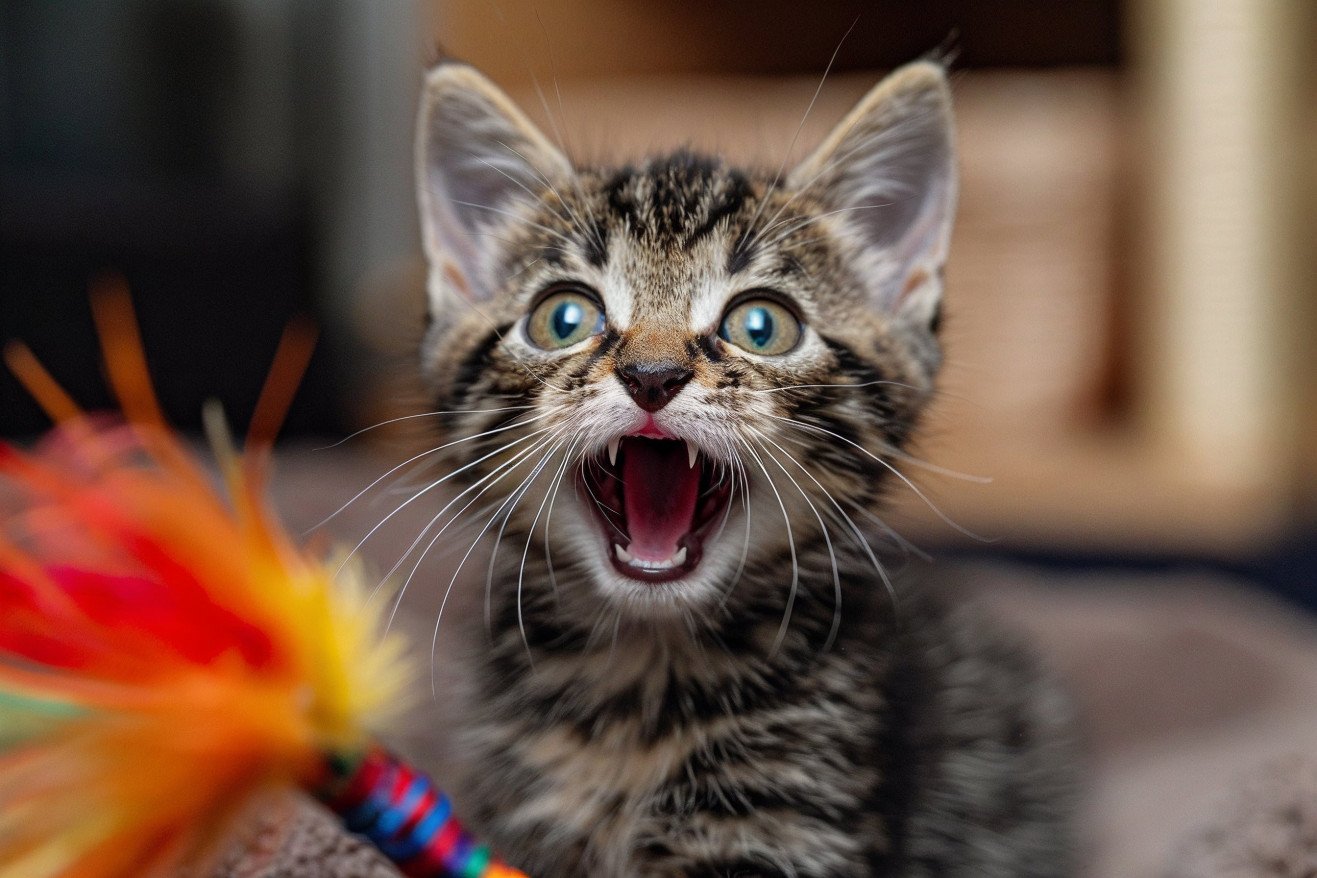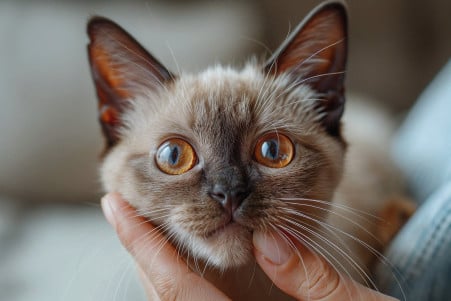How to Get a Kitten to Stop Biting: Techniques That Work
18 April 2024 • Updated 18 April 2024

If you're a new kitten parent who's dealing with the issue of sharp teeth, there are a number of ways to stop your kitten from biting that also encourage other positive behaviors. You can firmly say "no" and then walk away when your kitten bites. You can also redirect your kitten to toys that are okay to bite, like stuffed animals or kick toys. Make sure your kitten is getting enough stimulation and isn't just bored. With time and practice, you can train your kitten to know what's okay.
Below, we cover the training methods that vets and animal behaviorists recommend to stop your kitten from biting before it becomes a habit. This article is based on research that includes studies on the psychology of kittens and the developmental stages of cats, and it offers a kind, evidence-based approach that you can rely on. By the time you're done, you'll know how to transform your energetic kitten into a snuggly, loving pet.
How can I get a kitten to stop biting?
Why Do Kittens Bite?
There are several reasons why kittens bite, and many of them are completely normal and healthy parts of their development. For example, according to BeChewy, kittens use their mouths to explore their environment and this is an extension of their natural hunting instincts. In addition, teething is a major cause of biting, and according to Newsweek, kittens will be teething from 8 weeks to 6-7 months old as their adult teeth come in.
Kittens may also bite as a result of nursing instincts, which can cause them to give "love bites" when they're feeling affectionate, according to Elanco. Other reasons for biting include play aggression and testing boundaries. Lack of socialization, especially if a kitten is separated from their mother and littermates too early, can also lead to biting because the kitten didn't have a chance to learn proper play behavior.
Finally, biting can be a sign of fear or pain. It's important to make sure that kittens have plenty of opportunities to engage in natural behaviors like hunting and chewing, and according to BeChewy, this can be accomplished by providing them with toys like wands, balls and scratchers. This way, they can engage in these natural behaviors without biting their owners. Knowing the reasons for biting can help cat owners respond to biting in a way that's compassionate and that helps kittens develop good habits.
Positive Reinforcement Methods to Stop Kitten Biting
Punishing or rough play can actually reinforce biting and increase aggression, according to Zoetis Petcare. Instead, the experts at The Humane Society of the United States suggest redirecting kittens to appropriate toys and using positive reinforcement to encourage good behavior.
Make sure you have a variety of interactive toys, such as wand toys, plush toys, and laser pointers, to help meet your kitten's natural hunting and play needs. You can also use clicker training and treats to reward your kitten for not biting during play or petting sessions, according to Feline Behavior Solutions. Always ignore and walk away when your kitten bites, so you don't reward the bad behavior.
This positive reinforcement method will help your kitten learn good play habits and build a strong, trusting relationship with you. By nipping biting in the bud, you can keep it from becoming a long-term problem.
How Socialization Can Help Prevent Kitten Biting
Proper socialization during the critical period of 2-7 weeks is important for kittens to learn healthy social behaviors, notes Pawlicy Advisor. Socialized kittens will have been exposed to people, animals, and different environments, which can help prevent fear and aggression. Alley Cat Allies says that socialization is the process of getting kittens used to new experiences, textures, sounds, and people in a positive way, which can help them feel safe and secure.
Socialization can help prevent biting problems, especially if you use methods like handling kittens gently every day, introducing new stimuli, and exposing them to a variety of people, as suggested by The Spruce Pets. However, if kittens are separated from their mother and littermates too soon, they may not have been properly socialized and may be more likely to bite inappropriately, according to Hill's Pet.
Offering the Right Chew Toys and Enrichment
Kittens' teething can lead to a lot of chewing and biting, and it can go on for a long time, up to 8 weeks to 6-7 months of age, while their adult teeth come in, according to Newsweek. Offering the right chew toys, like catnip-filled toys or edible chews, can help redirect this behavior, and this is recommended by Preventive Vet.
It's also a good idea to switch up the toys you offer to keep your kitten engaged and avoid boredom. Environmental enrichment, such as puzzle feeders and cat trees, can also help meet your kitten's needs to hunt and play, according to Catster. It's also important to make sure you're watching your kitten and redirecting it to appropriate toys if it tries to bite your hands or furniture, and this is recommended by Catster.
When to Get Help for Kitten Biting
In some cases, you may need to enlist the help of a professional animal behaviorist or veterinarian to address persistent kitten biting, according to Pet InfoRx. If you have been working with your kitten and redirecting their biting for a while and the behavior doesn't seem to be improving, there may be an underlying issue. As Anti-Cruelty points out, a professional can help determine if there are medical or behavioral issues at play and offer personalized advice.
Professional help may involve desensitization and counterconditioning or, in more extreme cases, medication, according to VCA Animal Hospitals. The sooner you address the problem and get professional help, the less likely the behavior will become a habit. Even the most persistent kitten biters can learn to set limits and become loving, well-behaved pets with the right help.
Conclusion: How to Form a Positive Relationship With Your Kitten
Consistently and effectively addressing kitten biting is essential for ensuring a positive, healthy relationship with your cat. By understanding the developmental stages and causes of biting, owners can work to address the issue with understanding and patience.
Positive reinforcement, socialization, and ensuring that kittens have appropriate ways to expend their energy and satisfy their chewing instincts are all important ways to help kittens learn not to bite. With time, patience, and the right approach, kittens can learn to understand their limits and grow up to be well-behaved, loving pets. Seeking help from a professional can offer additional support and guidance, especially for more severe cases.


